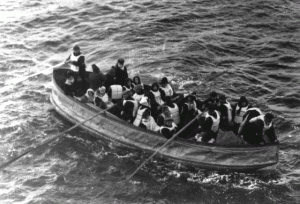This year marks the 100th anniversary of the day the White Star’s Titanic sank, and of course what good blogger worth his salt would not make mention of it in his, or hers, blog. Since I don’t want my salt value to decline along with the other already declining things in my life, here’s my contribution in order to be worth my salt.
All this Titanic hoopla is a kind of continuing celebration given all the interest in recent decades in finding the wreck, diving to it, and displaying artifacts retrieved from it. This recent interest has spawned the blockbuster Cameron movie (and the re-movie in 3-D) and numerous documentaries about the theories into the sinking. We are on Titanic-overload. It’s getting to the point where I know more about the science of the Titanic sinking than I do about how my toilet works. You gotta admit though, the graphics are cool in how they re-enact certain aspects. The latest contributing factors to the loss of life is now attributed to some weather phenom.. a thermal inversion, which caused a mirage effect.. making accurate visual iceberg detection nearly impossible, and also confusing the lookouts on a nearby ship, the S.S. Californian, as to the true distance away they were from the doomed ship. Also, apparently the moon’s distance from the Earth was the closest in 1,400 years.. thus causing the sea to rise more than normal and break off more icebergs. The bottom line, reasons were stacking up against the ship from the get go.
 Anyway, I’ve gotten to thinking about all the things that the Titanic sinking has spawned in our current society. There’s the obvious maritime stuff… maritime laws regarding lifeboat availability and design, when to abandon ship versus when to just stay onboard, ship design, international distress calling, and international ice patrols. While there was no law regarding “women & children first” in abandoning ship, it was the call to order that night on the Titanic. In reality, if there are enough lifeboats then that would never be an issue. But it remains an oft quoted phrase.
Anyway, I’ve gotten to thinking about all the things that the Titanic sinking has spawned in our current society. There’s the obvious maritime stuff… maritime laws regarding lifeboat availability and design, when to abandon ship versus when to just stay onboard, ship design, international distress calling, and international ice patrols. While there was no law regarding “women & children first” in abandoning ship, it was the call to order that night on the Titanic. In reality, if there are enough lifeboats then that would never be an issue. But it remains an oft quoted phrase.
Then there’s the classic and timeless… “..and the band played on.” It’s one of those great and indelible quotes of our times. Taken from a newspaper headline at the time of the tragedy (from an interview with a survivor), it has come to represent the apparent futility of continuing a course when the end is inevitable. While the courage of those original band members is the stuff of legend and admiration, it is recognized as a clinging to life in the face of death. The saying is much used in social circles, business, and politics.
Being an amatuer radio guy I am naturally drawn to the radio exchanges between the Titanic and the other ships in the area. One quote I have used on a couple occasions has been, “Wonderful thing, wireless, isn’t it?”. Accredited to the captain of the Carpathia (the survivor rescue ship) as he commented about a current radio report from ships in the vicinity of icebergs in the area. Interestingly, Morse Code usage by radio, in its infancy at the time of the sinking, was the first use of abbreviated words for brevity in transmission. It was NOT a result of teen usage of modern day phone text messaging. Senior Titanic wireless officer, Jack Phillips, tapped out to the wireless operator of the Carpathia upon receiving word that the ship was heading to their aid, “TU OM”… which meant, “thank you, old man”.
The entire tragedy has given us an empathic desire to understand what we might have done on that day. It’s given us an awareness of the struggle for life when life is in peril; of how humans act in survivor situations. How panic can be just as useful in saving ourselves as much as it is in hastening our doom. It’s about having to make an instant decision in saving our loved ones over saving ourselves. Not a person who boards a cruise ship doesn’t think, if even momentarily, about the Titanic and those on board.
 Well… the survivors of the tragedy became notables in their own time.. interviews and in some cases, published books, their stories continue to inspire to this day. The irony to all this is that in spite of the sinking of the Titanic on its maiden voyage the one thing that has remained unsinkable is the memory… and the mystery.
Well… the survivors of the tragedy became notables in their own time.. interviews and in some cases, published books, their stories continue to inspire to this day. The irony to all this is that in spite of the sinking of the Titanic on its maiden voyage the one thing that has remained unsinkable is the memory… and the mystery.
http://plg96.blogspot.com/2012/09/titanic.html#links

Tidak ada komentar:
Posting Komentar